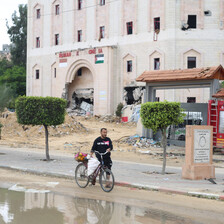The Electronic Intifada 18 September 2024

These shrouded bodies appear to be intact, but that is often not the case following Israeli bombardments.
ZUMAPRESSDuring my shift at al-Aqsa hospital, I encountered a childhood friend I hadn’t seen in a good while, a doctor who studied with me at Al-Azhar University in Gaza. I saw her in the emergency department, and when we met, her eyes were filled with sadness, and words were seemingly trapped in her chest.
Islam Khaled al-Jorani confided in me about what had happened to her.
Her story took me to another world full of pain. She began to recount her suffering, hardly believing that she was still alive. The war left her family with no hope, only distorted memories and a deep, unhealed wound.
This is Islam’s story:
Like many families in Gaza, mine has been forced to evacuate repeatedly during the Israeli genocide, but the first time was the harshest. When the warning came, we had to leave our home and go to my uncle’s house. I went with my parents, five sisters, and two brothers.
On the morning of 31 October 2023, my sister Nahid, who had evacuated earlier with us, decided to return home with her two children, Suhail and Samar, to take a shower, as there was no running water in my uncle’s house. Nahid asked me to accompany her, but I refused.
Instead, my sisters Abir and Iman went with her. They had been warned about the dangers of returning to our home area. Less than an hour had passed after they left before we heard the explosions. I soon realized that the bombing had targeted our street.
Shocking discovery
I rushed to the area. What I found was shocking. There were no buildings left, only scattered rubble and rocks. The area was completely unrecognizable. I couldn’t identify our house except by a nearby shop sign.
I lost control and started screaming, “Oh God, oh God,” begging passersby to help me. An ambulance arrived, and I was told to go to the hospital to look for my family.
At Kamal Adwan hospital, where I had volunteered before the evacuation, I found Nahid. I could only recognize her by her clothes; the bombing had completely disfigured her. I sat beside her body, as if the world had stopped. With a trembling hand, I wrapped her in a shroud and wrote her name on it, then left her among the bodies in the hospital yard.
Nahid started studying IT at university, married in 2019, then gave birth to her son Suhail in 2020.
Her daughter Samar followed. As with almost all people in Gaza, securing treatment and medicine following her daughter’s epilepsy diagnosis was a difficult journey for her family.
After leaving Nahid’s body, I went to the Indonesian hospital, frantically searching for the rest of the family. I didn’t find Abir or Iman, nor Samar, the little girl who hadn’t yet turned one. I only found small body parts belonging to Suhail. The news reached me that some people were still under the rubble, and their bodies had not yet been recovered.
The pain tore at my heart when I heard that Nahid’s husband, who is also my cousin, had become hysterical searching for the body of his little daughter. She hasn’t been found.
I transferred what was left of Suhail’s body from the Indonesian hospital to Kamal Adwan hospital on a donkey cart, placing it next to his mother’s body in the morgue. In the morning, they were taken to the cemetery on the same cart, without any family members having the chance to say goodbye. My father, who came to the hospital to take one last look, couldn’t find them; they had been buried before he arrived.
I didn’t have time to cry for them; pain overtook everything. Nothing comforted me except the belief that Suhail is now a bird in paradise.
A few days later, my uncle’s house, where my remaining family had sought refuge, was bombed. We crawled out from under the rubble, grabbed what clothes we could and went to another house. But that house, too, didn’t escape the bombing.
We were forced to evacuate to the south 45 days after the Israeli attacks began. During this evacuation, my uncle was severely injured – a bombing severed his leg – adding to our suffering. We carried him with us to the south.
We passed through the occupation’s checkpoints, subjected to humiliation and degradation. When we reached the south, we were shocked to find conditions no better. We had left our homes with no clothes, no food, no water, and then spent long days in a tent on the street.
Haunting memories
I saw my sisters everywhere and heard their voices calling me. I often regret not accompanying Nahid; perhaps Abir and Iman would have stayed at my uncle’s house and not been martyred. Memories haunted me every moment, and I couldn’t taste joy after what happened.
I used to bring my niece Samar medicine from the Indonesian hospital to treat her epilepsy. The day before the bombing I brought her a strip of medicine, but it stayed in my bag even during our evacuations. Every time I look at the strip, I remember her, and my mind deceives me into thinking she might still be alive because I haven’t found her body yet.
I will keep the medicine; it is the only physical tie I have left to her.
I will neither forget nor forgive.
Shrooq Hijazi is a volunteer doctor.




